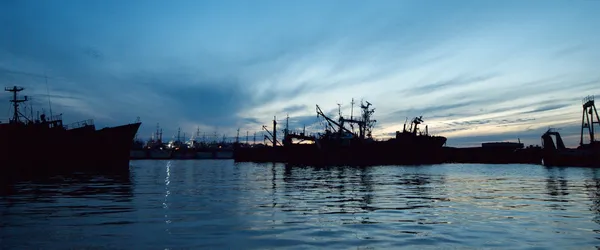Eye For Film >> Movies >> Nocturno: Ghosts Of The Sea In Port (2017) Film Review
Nocturno: Ghosts Of The Sea In Port
Reviewed by: Andrew Robertson

The Nocturne, a chamber piece to be performed in the evening, of or resembling the night. DeBussy's Sirens, song of the sea. Xavier Villarrutia's poem, Nocturno Mar, elegantly set type emerging from the sea, black to blue, blue to black. Strings and woodwinds, air and water, light and dark.
Alvaro F Pulpeiro's début feature, Nocturno, variously subtitled but Ghosts Of The Sea In Port is an experimental documentary, a fictive hybrid. The programme notes at Edinburgh's 2018 Film Festival mention Dead Slow Ahead, but the literary weight of the littoral draws all sorts of comparisons. This is poesy in motion, more about senses than sense.
The sea gives way to other brine, either tears or sweat, on an eyelid shot so close as to be intrusive, pink crinkled mucous intimacy. There is an intermittent blink, not those lashes, some something not quite a lighthouse, a screen central sentinel in the frothing offing. The sea, the sky, the city, each balanced, beautiful. This is a certain industrial landscape, a skyline punctuated by the pipe-tangle silhouette of something with the spirit of a refinery, orange lights in centre, chimney stacks lit by horizon red-yellows. Hulls and hulks are inter-mingled in the harbour, birds perched on crows-nests, roosting upon rusting railings.
Another boat is in port, its crew ashore. Fish are being landed, a brief stop in port of reach of cell signal, of socialisation, of sex. The fish are drawn from a hold, break bulk, stacked chilled to carcass cord-wood, a piscine puzzle drawn forth on fresh lines, angled ashore by crane to container, still steaming cold. Amongst it, awaiting a padlock, shark fins. Bagged until they are broken, sledgehammers splitting the sacked segments. Indelicate handling for a delicacy, pectoral, lateral, dorsal, the control surfaces of the noble tiburon broken on pallets. Elsewhere other flesh is readied for trade, interspersed with fumbling and sweat is the glow of filament, resistant burning, tightly wound. Turned off. There are interzones, otherwise central zones, barriers and activities short of things, anatomy that classificiation scholars will compare to geography.
Louis Dodd's music, Thomas Blazukas' sound, Mauricio Reyes Serrano's work as DoP - all give a sense of the dreaming seas, the night, choirs and candlelit coves, corneal close-up. Eye For Film saw in Edinburgh on a more than mild mid-afternoon, skies empty of clouds and bright blue. Not quite the nocturne; even now in the small hours there's amber o'er the Forth, the new crossing's red lights as sure a signal of modern complexity as any part of the film. One can't have everything. There was a technical hitch, itself at a moment where those on screen were seeking to fix a technical hitch, "it's like this, don't you see?". These things happen. It wasn't a problem for me, but it can be off-putting for some. So too the film. Somewhere between shallow surface and deeper truth, at once current and slack, it's hard to know (as with Luk'Luk'i) what is script, improvisation, history, but it does not matter. Let the air take you, while the sea cannot.
Reviewed on: 25 Jun 2018















